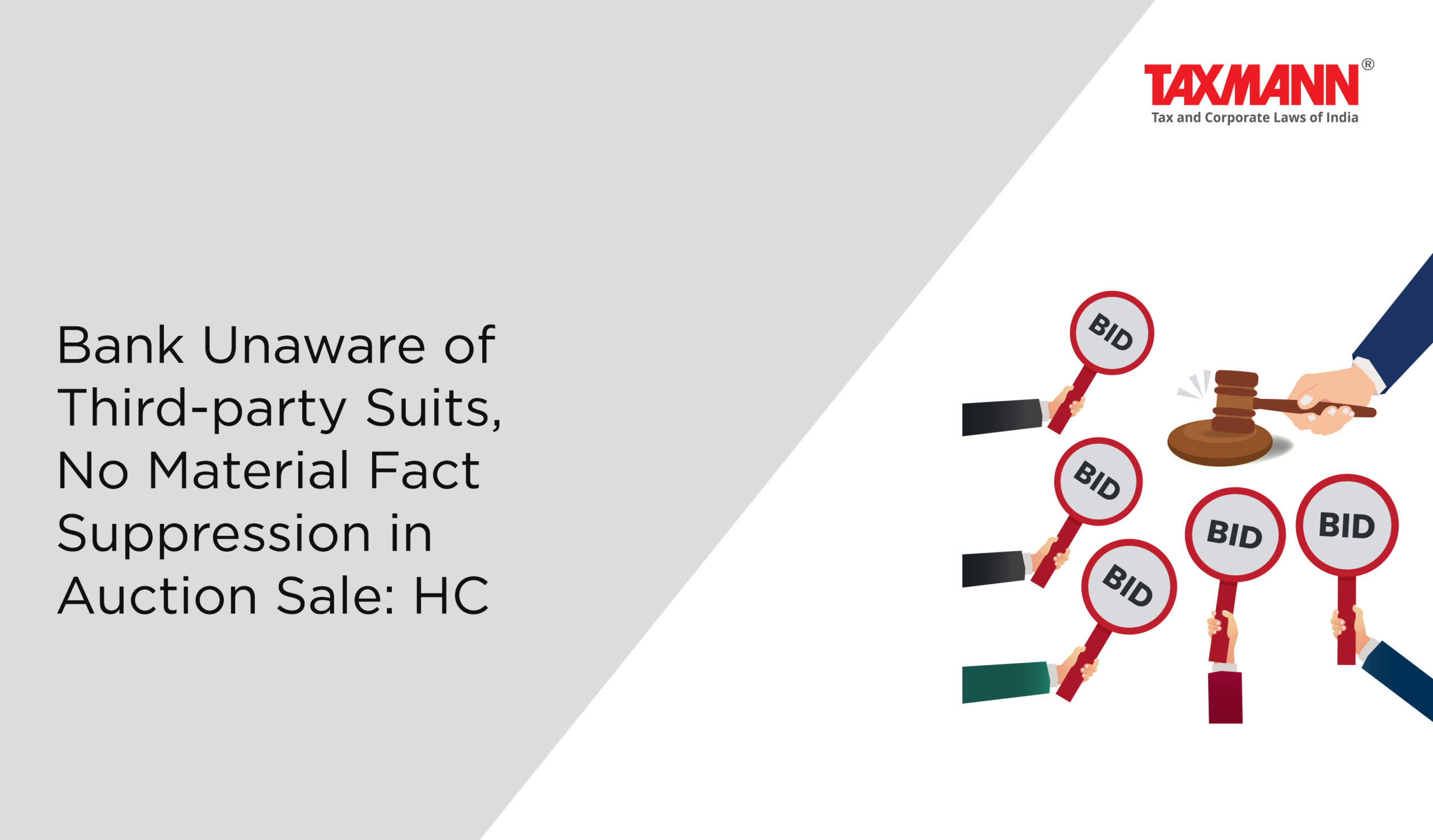Bank Unaware of Third-party Suits, No Material Fact Suppression in Auction Sale: HC
- Blog|News|FEMA & Banking|
- 2 Min Read
- By Taxmann
- |
- Last Updated on 21 June, 2023

Case Details: Vinjam Srinivasa Rao v. Union of India - [2023] 150 taxmann.com 396 (Andhra Pradesh)
Judiciary and Counsel Details
-
- U. Durga Prasad Rao & B.V.L.N. Chakravarthi, JJ.
- N. Subba Rao, Adv. for the Petitioner.
- Harinath N. & Harinarayana K, Advs. for the Respondent.
Facts of the Case
In the instant case, the Land belonging to the borrower company was secured asset with the respondent bank, which later issued a notice under section 13(2) of the of the Securitisation and Reconstruction of Financial Assets and Enforcement of Security Interest Act, 2002 (SARFAESI, 2002) to borrower company.
Later, the Bank issued an auction notice for sale of said land. Subsequently, the auction was conducted wherein petitioner emerged as successful bidder.
Consequently, the Petitioner had alleged that after payment of entire sale consideration and obtaining sale certificate, he came to know that subject property was beset with a number of encumbrances in form of Court attachments in a huge number of cases.
However, the bank had suppressed said material facts and conducted e-auction sale. The Petitioner, believing that property was a free-hold and unencumbered, purchased same for a huge amount and thus, he was cheated by the bank.
Hence, the petitioner made a representation to refund bid amount with interest and cancel sale certificate. However, bank had not taken any action. Subsequently, the Petitioner filed instant writ declaring action of bank as illegal.
In the present matter, it was noted that instant writ was silent as to particulars of third parties and nature of claims made by them and it was not known that whether secured interest was prior to mortgage by deposit of title deeds executed by borrower in favour of bank.
Thus, merely because some third parties filed suit and obtained attachment of subject property, it could not be held that said parties had any priority over bank, particularly in light of fact that Encumbrance certificate obtained by bank showed that on date of auction sale there were no encumbrances.
Further, bank was not a party to any of suits or execution petitions filed by third parties and had not received any Court notices. Thus, the bank had no occasion to know about filing of suits by third parties.
High Court Held
Therefore, the High Court observed that the petitioner could not clamour that bank had suppressed material facts related to encumbrances over subject property and sold same in auction by cheating petitioner.
Thus, the High Court held that there was no reason either on facts or in law to set aside sale and, instant writ was to be dismissed.
List of Cases Reviewed
-
- Mandava Krishna Chaitanya v. UCO Bank 2018 (3) ALD 266 (para 16)
- Haryana Financial Corporation v. Rajesh Gupta [2010] 1 SCC 655 (para 16) distinguished.
List of Cases Referred to
-
- Mandava Krishna Chaitanya v. UCO Bank 2018 (3) ALD 266 (para 5)
- Haryana Financial Corporation v. Rajesh Gupta [2010] 1 SCC 655 (para 5)
- S.U.S Davey Sons v. P.M. Narayana Swamy AIR 1983 Mad 217 (para 11)
- Syndicate Bank v. National Wire Products AIR 1994 Guj 2 (para 11)
- My Forex Services (P.) Ltd. v. City Men Forex & Travels Ltd. AIR 2008 Mad 42 (para 11).
Disclaimer: The content/information published on the website is only for general information of the user and shall not be construed as legal advice. While the Taxmann has exercised reasonable efforts to ensure the veracity of information/content published, Taxmann shall be under no liability in any manner whatsoever for incorrect information, if any.

Taxmann Publications has a dedicated in-house Research & Editorial Team. This team consists of a team of Chartered Accountants, Company Secretaries, and Lawyers. This team works under the guidance and supervision of editor-in-chief Mr Rakesh Bhargava.
The Research and Editorial Team is responsible for developing reliable and accurate content for the readers. The team follows the six-sigma approach to achieve the benchmark of zero error in its publications and research platforms. The team ensures that the following publication guidelines are thoroughly followed while developing the content:
- The statutory material is obtained only from the authorized and reliable sources
- All the latest developments in the judicial and legislative fields are covered
- Prepare the analytical write-ups on current, controversial, and important issues to help the readers to understand the concept and its implications
- Every content published by Taxmann is complete, accurate and lucid
- All evidence-based statements are supported with proper reference to Section, Circular No., Notification No. or citations
- The golden rules of grammar, style and consistency are thoroughly followed
- Font and size that’s easy to read and remain consistent across all imprint and digital publications are applied



 CA | CS | CMA
CA | CS | CMA
